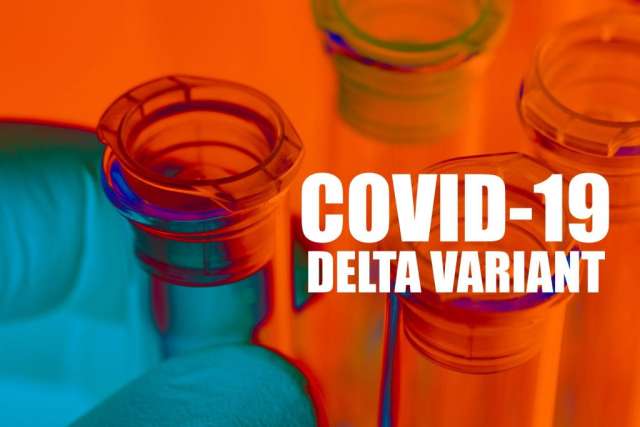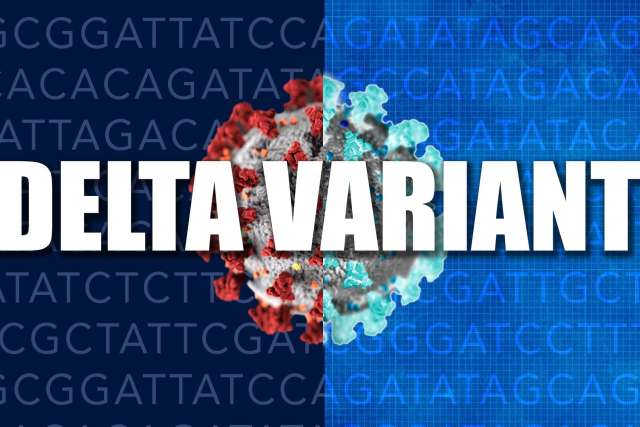The exponential spread of the COVID-19 Delta variant already has put a damper on what was to be a summer of socializing and vaccine-inspired freedoms. But recent studies suggest the highly contagious variant is even more dangerous than scientists initially believed, says Shangxin Yang, PhD, a pathologist at UCLA Health.
“The Delta is a different virus now, and it’s able to spread among both vaccinated and unvaccinated people,” says Dr. Yang. “This really changes the dynamic and how we see the future.”
The optimism brought about by the success of COVID-19 vaccines has given way to uncertainty, he says.
What’s different about Delta?

The Delta variant is genetically different from previous coronavirus variants, with a specific mutation in the spike protein it uses to latch onto and infect healthy cells.
“Because of that, the virus is much more efficiently infecting the cells and rendering the virus a lot more contagious,” Dr. Yang says.
People infected with this now-dominant variant become sick more quickly, he says, with fewer days elapsing between exposure and the onset of symptoms.
Especially worrisome is the high viral load — the amount of virus present in an infected person’s system — associated with Delta, Dr. Yang says. Studies show it may be 100 to 1000 times higher compared to other coronavirus variants.
This high viral load is observed equally in vaccinated and unvaccinated people, Dr. Yang says, a development he calls “most concerning.”
“The implication is that, the first week after infection, both vaccinated and unvaccinated people can transmit the virus,” he says. “This is one reason for the surge we’re seeing now and cases increasing everywhere.”
With infections from previous variants, vaccinated people showed a much lower viral load than unvaccinated people.
“This variant really changed everything,” Dr. Yang says.

What does this mean for fully vaccinated folks?
The COVID-19 vaccines from Pfizer, Moderna and Johnson & Johnson are based on the spike protein, so changes to the structure and function of this protein in circulating variants threaten the efficacy of the current vaccine formulations.
Mutations to the spike protein in the Delta variant may reduce the efficacy of the vaccines by as much as 30%, Dr. Yang says. Monoclonal antibody treatments are also less effective against infections caused by this variant.
The current vaccines still work to prevent serious illness, Dr. Yang says, but aren’t as effective in preventing transmission of Delta. “So if people are not vaccinated, they can get infected much more easily now,” he says.
While the viral load may be equally high in vaccinated and unvaccinated people infected by the Delta variant, studies show it drops significantly more quickly in vaccinated people after one week. The same rapid drop wasn’t seen in unvaccinated individuals. Therefore, vaccination can still help slow down the spread of the Delta variant.
Is the Delta variant more dangerous?
Scientists are still learning whether the Delta variant causes more severe symptoms.
“We definitely know it’s more infectious and it makes vaccines less effective,” Dr. Yang says. “But whether it makes people sicker is an important question that’s yet to be answered.”
The variant does appear to cause more significant symptoms in vaccinated people who get infected, according to a recent study. It found that close to 80% of vaccinated people who experienced breakthrough infections developed symptoms. Nearly all of those cases were caused by the Delta variant.
It’s unclear if breakthrough infections in vaccinated people can lead to the persistent symptoms known as “long COVID,” which Dr. Yang says is all the more reason to take every precaution.
“We need to be on the safer side and be very careful about this virus, and respect the Delta variant,” he says. “We should pretend that we’re going back to last year, when nobody was vaccinated and the risk hasn’t been reduced much, because of Delta.”
Learn more about the virus and vaccines on the COVID-19 info hub.



